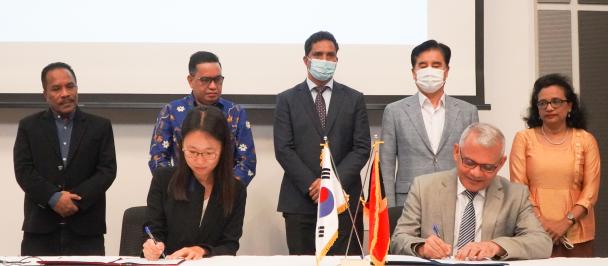The country increased its HDI rank by one place to 132, compared to 133 in the HDI 2016
Timor-Leste improves global human development ranking: UNDP report
September 20, 2018
Dili, 21 September 2018: Timor-Leste has seen a slight improvement in its global ranking in the latest Human Development Index (HDI) released this month by the United Nations Development Programme (UNDP) which measures national development economic and wellbeing achievements including health, education and income across 189 countries and territories.
The country increased its HDI rank by one place to 132, compared to 133 in the HDI 2016. This places Timor-Leste in the ‘Medium Human Development’ category alongside other Asia-Pacific countries including Lao People's Democratic Republic, Bangladesh and Cambodia.
Average life expectancy at birth in Timor-Leste has increased to 69.2, while Gross National Income (GNI) per capita increased to $6,846 and the proportion of youth who are unemployed reduced to 11.6 per cent.
In addition, the per centage of GDP allocated to health expenditure increased to 3.1 per cent. The number of expected years of schooling and level of secondary school enrolment also saw small increases during the previous five-year period.
“The overall trend in Timor-Leste is toward continued human development outcome improvements, which will support the country to unlock the potential of its youthful population,” said UNDP Timor-Leste Country Director Mr. Claudio Providas.
“However, a reduction in public investment in 2017-2018 has the potential to harm momentum, resulting in a subsequent loss of development gains.
“Unemployed youth continue to face multiple wellbeing vulnerabilities and unless more targeted and quality investments are made in health, education and the economy, Timor-Leste may miss out on this unique opportunity to unleash its development potential over the next few decades.
“Another issue to be mindful of is the gap in opportunities, achievements and empowerment between women and men. In Timor-Leste the HDI for women is lower than for men, due to women’s lower income and educational attainment.”
The Timor-Leste National Human Development Report 2018 found that inadequate investments in education and training are resulting in a large pool of unemployed youth who feel unprepared for and lack the skills required to access decent employment. This is intensified for adolescent girls and young women who are further disadvantaged in fully participating in education and the economy due to gender roles.
Timor-Leste is one of the youngest countries in the world with 74 per cent of the population aged under 35, making it the second youngest nation in the Asia-Pacific region after Afghanistan and 15th youngest globally. Consequently, young people have the potential to play an extremely important role in the country’s achievement of its future development aspirations.
The Asia-Pacific region registered the second highest growth in HDI at 41.8 per cent between 1990 and 2017. However, when adjusted for inequality, it experienced a 15.6 per cent loss in HDI. Average HDI levels in least developed countries have risen by 51 per cent since 1990, reflecting that on average people are living longer, are more educated and have greater income. But there remain massive differences across the world in people’s well-being.
### ### ###
MEDIA CONTACTS
For more information and interviews please contact: media.tl@undp.org
NOTES TO EDITORS
ABOUT THE HDI: The Human Development Index (HDI) was introduced in the first Human Development Report in 1990 and covers 189 countries and territories. Access the full 2018 Statistical Update: http://hdr.undp.org/en/2018-update
Timor-Leste’s 4th National Human Development Report is a collaborative project between the Government of Timor-Leste, UNDP and Flinders University, Australia. It aims to promote public discussion and policy making around the realization of young age structures, investing in youth and their well-being to benefit from a potential demographic dividend. The report is a tool for evidence-based decision making towards improved human development and well-being in Timor-Leste, particularly among the youth. Download the report: http://bit.ly/TLNHDR2018
UNDP partners with people at all levels of society to help build nations that can withstand crisis, and drive and sustain the kind of growth that improves the quality of life for everyone. On the ground in nearly 170 countries and territories, we offer global perspective and local insight to help empower lives and build resilient nations.

 Locations
Locations


